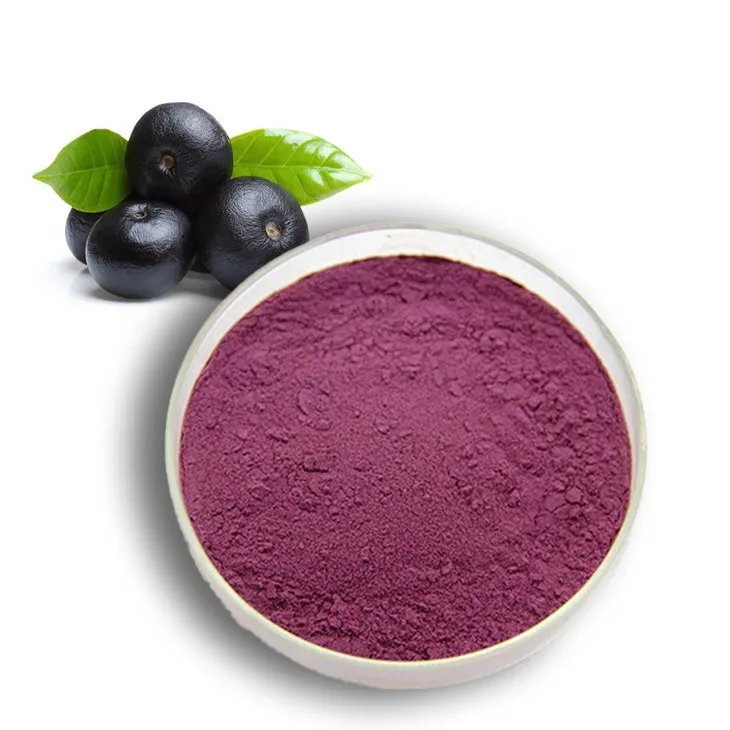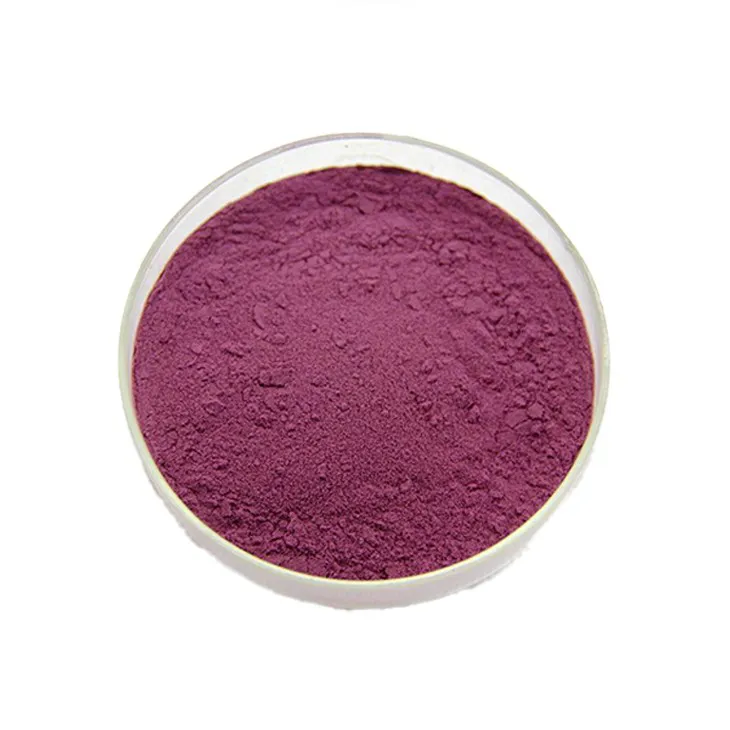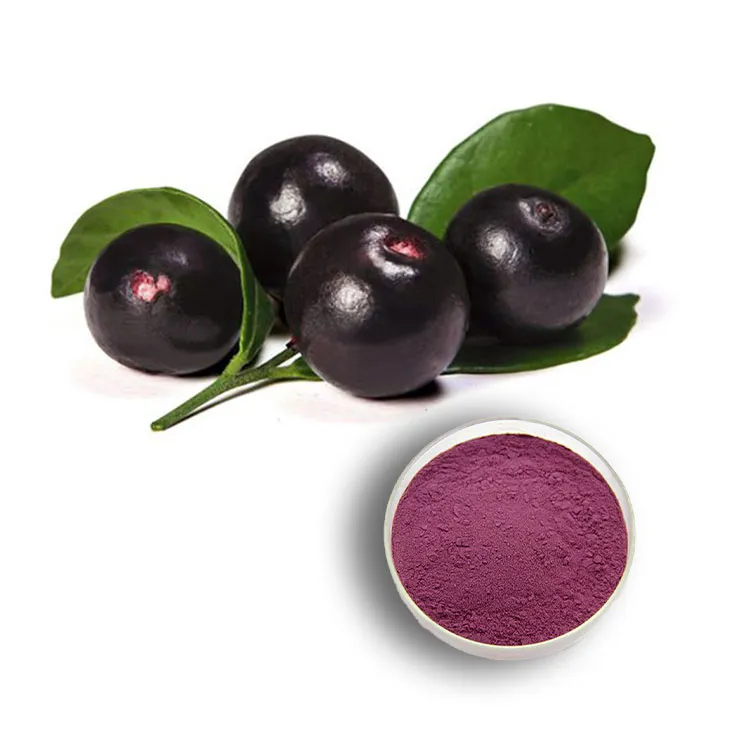- 0086-571-85302990
- sales@greenskybio.com
Is acai berry extract beneficial for diabetes? Are these all safe and suitable for diabetic patients?
2024-11-11

1. Introduction
Diabetes is a chronic metabolic disorder that affects millions of people worldwide. Management of blood sugar levels is crucial for diabetic patients. In recent years, natural products like the Brazilian Acai Berry Extract have gained attention for their potential health benefits, including those related to diabetes. However, it is essential to thoroughly examine both the potential benefits and safety aspects, especially when considering its use for a vulnerable group like diabetic patients.

2. The Acai Berry: An Overview
The acai berry is native to the Amazon rainforest in Brazil. It has been a part of the traditional diet of indigenous people for centuries. The berry is rich in nutrients, such as vitamins (including vitamin A, C, and E), minerals (like potassium, calcium, and magnesium), and healthy fats (particularly oleic acid). It also contains a high amount of antioxidants, which play a vital role in protecting the body from oxidative stress.
2.1. Antioxidant Properties
Antioxidants in Acai Berry Extract, such as anthocyanins, flavonoids, and phenolic acids, are responsible for its antioxidant activity. Oxidative stress is implicated in the development and progression of diabetes. By neutralizing free radicals, these antioxidants may help reduce the risk of diabetic complications. For example, they can potentially protect the blood vessels from damage, which is a common problem in diabetes.

3. Potential Benefits of Acai Berry Extract for Diabetes
3.1. Blood Sugar Regulation
Some studies suggest that acai berry extract may have a positive impact on blood sugar regulation. It may enhance insulin sensitivity, which is crucial for proper glucose metabolism. Insulin is the hormone responsible for transporting glucose from the bloodstream into cells. In diabetic patients, insulin resistance is a common problem. By improving insulin sensitivity, acai berry extract could potentially help cells respond better to insulin, thereby reducing blood sugar levels.
3.2. Anti - inflammatory Effects
Chronic inflammation is associated with diabetes. Acai berry extract has been shown to possess anti - inflammatory properties. The anti - inflammatory compounds in the extract can help reduce the low - grade inflammation that is often present in diabetic patients. This may contribute to better overall health and potentially help in the management of diabetes - related complications, such as nerve damage and kidney problems.
3.3. Weight Management
Many diabetic patients struggle with weight management. Acai berry extract may play a role in weight control. It contains fiber, which can increase satiety and reduce appetite. Additionally, its antioxidant and anti - inflammatory properties may also be beneficial for metabolic health, which is closely related to weight management. By promoting a healthy metabolism, it could potentially assist diabetic patients in maintaining a healthy weight, which is important for blood sugar control.

4. Safety Concerns for Diabetic Patients
4.1. Interaction with Medications
One of the major safety concerns for diabetic patients considering acai berry extract is the potential for drug - drug interactions. Diabetic patients often take medications to control their blood sugar levels, such as metformin, sulfonylureas, or insulin. Acai berry extract may interact with these medications, either enhancing or reducing their effectiveness. For example, if it enhances the action of insulin, it could lead to hypoglycemia (low blood sugar), which is a dangerous condition for diabetic patients. On the other hand, if it reduces the effectiveness of medications, blood sugar control may be compromised.
4.2. Purity and Quality
The purity and quality of acai berry extract products on the market can vary widely. Some products may be contaminated with heavy metals, pesticides, or other harmful substances. Diabetic patients, who are already in a vulnerable health state, are more susceptible to the harmful effects of such contaminants. Therefore, it is crucial to ensure that the acai berry extract is from a reliable source and has been tested for purity and quality.
4.3. Allergic Reactions
Although allergic reactions to acai berry are relatively rare, they can occur. Diabetic patients may have a higher risk of developing complications from allergic reactions due to their underlying health conditions. Symptoms of an allergic reaction may include skin rashes, itching, swelling, or difficulty breathing. In severe cases, anaphylactic shock can occur, which is a life - threatening condition.

5. Research Findings on Acai Berry Extract and Diabetes
Several research studies have been conducted to explore the relationship between acai berry extract and diabetes. However, the results are not entirely conclusive.
5.1. In - vitro Studies
In - vitro studies, which are conducted in a laboratory setting using cell cultures, have shown promising results. For example, acai berry extract has been shown to stimulate glucose uptake in cells, similar to the action of insulin. These studies suggest that the extract may have potential in diabetes management. However, in - vitro studies have limitations as they do not fully replicate the complex biological environment of the human body.
5.2. Animal Studies
Animal studies have also provided some evidence of the benefits of acai berry extract in diabetes. In diabetic animal models, the extract has been shown to improve blood sugar control, reduce inflammation, and protect against diabetic complications. However, it is important to note that the results obtained from animal studies may not always be directly applicable to humans.
5.3. Human Clinical Trials
Human clinical trials on acai berry extract and diabetes are relatively limited. Some small - scale trials have reported positive effects on blood sugar levels and other metabolic parameters. For example, a short - term trial found that acai berry consumption was associated with a slight decrease in fasting blood sugar levels. However, larger and more comprehensive clinical trials are needed to confirm these findings and to fully understand the safety and effectiveness of acai berry extract in diabetic patients.
6. Recommendations for Diabetic Patients
Given the current state of knowledge regarding acai berry extract and diabetes, the following recommendations can be made for diabetic patients:
- Consult a Healthcare Provider: Before starting any new supplement, including acai berry extract, diabetic patients should consult their healthcare provider. The healthcare provider can assess the patient's individual health status, current medications, and potential risks and benefits.
- Choose High - Quality Products: If a diabetic patient decides to try acai berry extract, they should choose products from reliable sources. Look for products that have been tested for purity and quality, preferably those that are certified by recognized third - party organizations.
- Monitor Blood Sugar Levels: Diabetic patients should closely monitor their blood sugar levels when starting acai berry extract. Any significant changes in blood sugar levels, either an increase or a decrease, should be reported to the healthcare provider immediately.
7. Conclusion
In conclusion, acai berry extract shows potential benefits for diabetes, including blood sugar regulation, anti - inflammatory effects, and weight management. However, there are also significant safety concerns for diabetic patients, such as potential drug - interactions, purity and quality issues, and allergic reactions. More research, especially large - scale human clinical trials, is needed to fully understand the role of acai berry extract in diabetes management. Until then, diabetic patients should approach the use of acai berry extract with caution and under the guidance of a healthcare provider.
FAQ:
1. How does acai berry extract regulate blood sugar?
Some components in acai berry extract may interact with the body's metabolic processes related to glucose. It might enhance insulin sensitivity or influence the way cells take up glucose. However, the exact mechanisms are still not fully understood and are the subject of ongoing research.
2. What are the antioxidant effects of acai berry extract and how do they relate to diabetes?
Acai berry extract is rich in antioxidants such as anthocyanins. In diabetes, oxidative stress is often increased. The antioxidants in acai berry extract can help neutralize free radicals, reducing oxidative stress. This may potentially slow down the development of some diabetes - related complications.
3. Are there any side effects of acai berry extract for diabetic patients?
Yes, there can be side effects. For example, it may interact with medications diabetic patients are taking. Also, in some cases, it could cause allergic reactions. Some acai berry products may contain added sugars or other substances that are not suitable for diabetics.
4. How should diabetic patients use acai berry extract?
Before using acai berry extract, diabetic patients should consult their healthcare providers. If approved, it should be used in moderation and according to the recommended dosage. They should also carefully check the product label for any added ingredients that may be harmful.
5. Can acai berry extract replace diabetes medications?
No. Acai berry extract may have some beneficial effects on diabetes management, but it cannot replace the medications prescribed by doctors. Diabetes medications are specifically designed to control blood sugar levels, and their effectiveness has been proven through extensive clinical trials.
Related literature
- The Potential of Acai Berry in Diabetes Management"
- "Acai Berry Extract: Benefits and Risks for Diabetic Patients"
- "Antioxidant - Rich Acai Berry and its Role in Diabetes"
- ▶ Hesperidin
- ▶ Citrus Bioflavonoids
- ▶ Plant Extract
- ▶ lycopene
- ▶ Diosmin
- ▶ Grape seed extract
- ▶ Sea buckthorn Juice Powder
- ▶ Fruit Juice Powder
- ▶ Hops Extract
- ▶ Artichoke Extract
- ▶ Mushroom extract
- ▶ Astaxanthin
- ▶ Green Tea Extract
- ▶ Curcumin
- ▶ Horse Chestnut Extract
- ▶ Other Product
- ▶ Boswellia Serrata Extract
- ▶ Resveratrol
- ▶ Marigold Extract
- ▶ Grape Leaf Extract
- ▶ New Product
- ▶ Aminolevulinic acid
- ▶ Cranberry Extract
- ▶ Red Yeast Rice
- ▶ Red Wine Extract
-
Green coffee bean Extract
2024-11-11
-
Yam Extract
2024-11-11
-
Scutellaria Extract
2024-11-11
-
Oat Straw Extract Powder
2024-11-11
-
Golden Seal Extract
2024-11-11
-
Feverfew Extract
2024-11-11
-
Kupilu Extract
2024-11-11
-
Hericium erinaceus extract powder
2024-11-11
-
Resveratrol extract
2024-11-11
-
Horse Chestnut Extract
2024-11-11





















